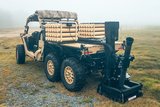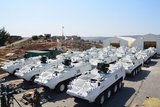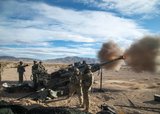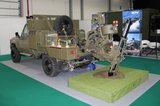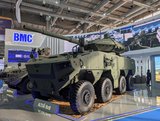Oshkosh to reset US Army M-ATV fleet
Oshkosh has won a contract from the US Army to reset its Mine Resistant Ambush Protected (MRAP) All-Terrain Vehicles (M-ATVs), the company announced on 5 February.
The programme to reset 800 Oshkosh-made MRAP M-ATVs will help the army standardise its M-ATV fleet configuration and achieve 100% mission readiness of its primary MRAP platform.
Oshkosh won a reset contract for 500 M-ATVs on 6 August 2014 and three additional contract options for 100 M-ATVs each on 12 December. It has already begun deliveries of the reset vehicles and will continue to deliver them up to September 2015.
The reset process for M-ATVs begins with a comprehensive vehicle configuration and condition inspection. After this, the company completes repairs, replaces missing parts and installs the necessary upgrade kits to match the current configuration of each M-ATV variant in the enduring fleet. These kits include automatic fire extinguishing systems, an underbody improvement kit and other safety-related improvements and more.
John Bryant, senior vice president, defence programmes, Oshkosh Defense, said: 'The M-ATV reset programme will ensure that all soldiers operating in M-ATVs will have fully-capable, mission-ready vehicles with all of the latest protection and technologies.'
Related Equipment in Defence Insight
More from Land Warfare
-
![British Army’s Project Stokes 120mm mortar bids due in March 2026]()
British Army’s Project Stokes 120mm mortar bids due in March 2026
Project Stokes could see a new 120mm mortar capability enter British service, with domestic production and international partnerships central to competing bids.
-
![World Defense Show 2026: Large vehicles and counter-drone systems take the limelight]()
World Defense Show 2026: Large vehicles and counter-drone systems take the limelight
Visitors who attended the first World Defense Show four years ago continue to speak of the difficulties they faced with poor facilities and power problems. This year’s event emphasised its status as one of the major defence expositions and as a place where regional players and those less welcome at other shows could take centre stage.
-
![MKJ Warrior Series — The Nett Warrior Qualified Connector for Today’s Soldier Systems]()
MKJ Warrior Series — The Nett Warrior Qualified Connector for Today’s Soldier Systems
ITT Cannon’s MKJ Warrior connectors are designed for the harshest environments, delivering mission critical comms, navigation and USB data/power.









